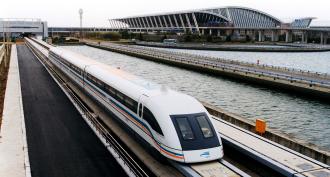China has unveiled a maglev train capable of a top speed of 600 kph, state media said.
The maximum speed would make the train, self-developed by China and manufactured in the coastal city of Qingdao, the fastest ground vehicle globally.
Using electro-magnetic force, the maglev train “levitates” above the track with no contact between body and rail.
China has been using the technology for almost two decades on a very limited scale. Shanghai has a short maglev line running from one of its airports to town.
While there are no inter-city or inter-province maglev lines yet in China that could make good use of the higher speeds, some cities including Shanghai and Chengdu have started to conduct research.
At 600 kph, it would only take 2.5 hours to travel from Beijing to Shanghai by train – a journey of more than 1,000 km (620 miles).
By comparison, the journey would take 3 hours by plane and 5.5 hours by high-speed rail.
Countries from Japan to Germany are also looking to build maglev networks, although high costs and incompatibility with current track infrastructure remain hurdles to rapid development.
Republished with permission of the World Economic Forum under a Creative Commons license. Read the original article.
